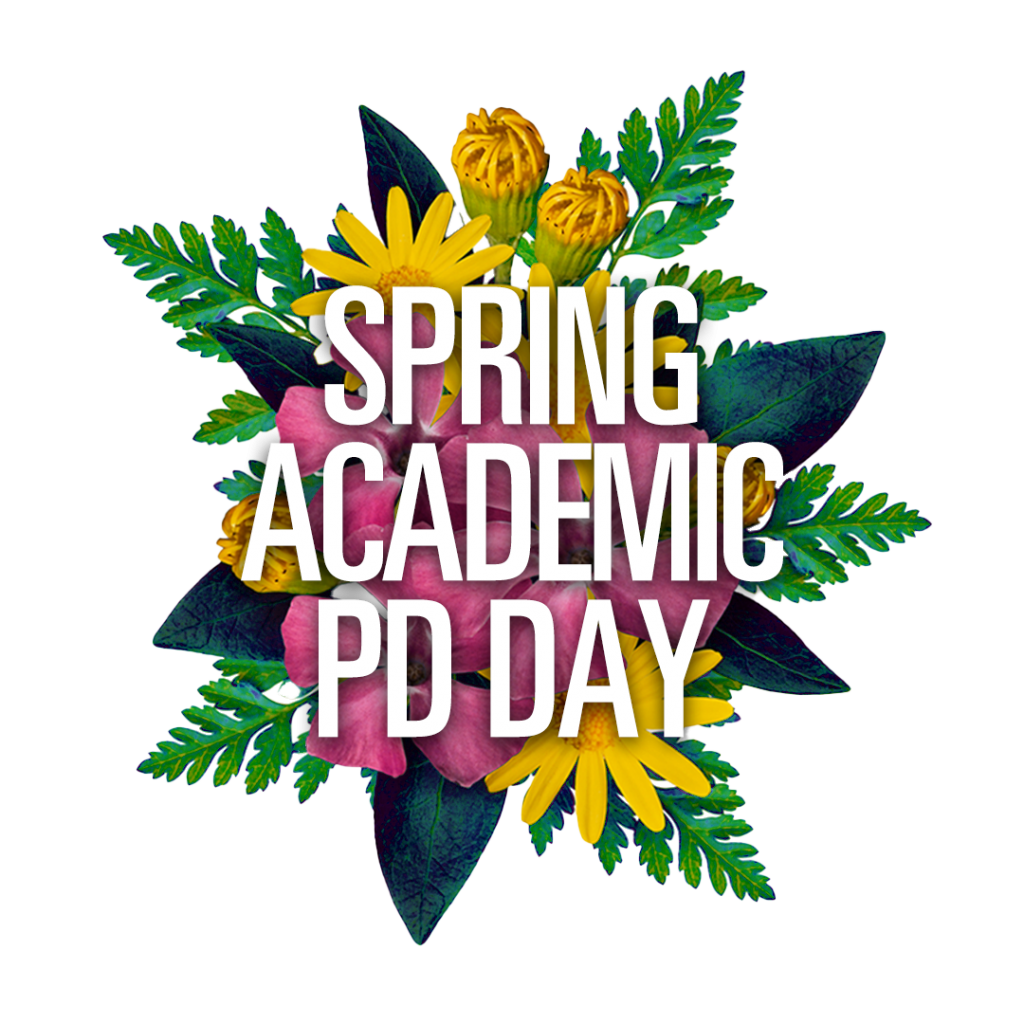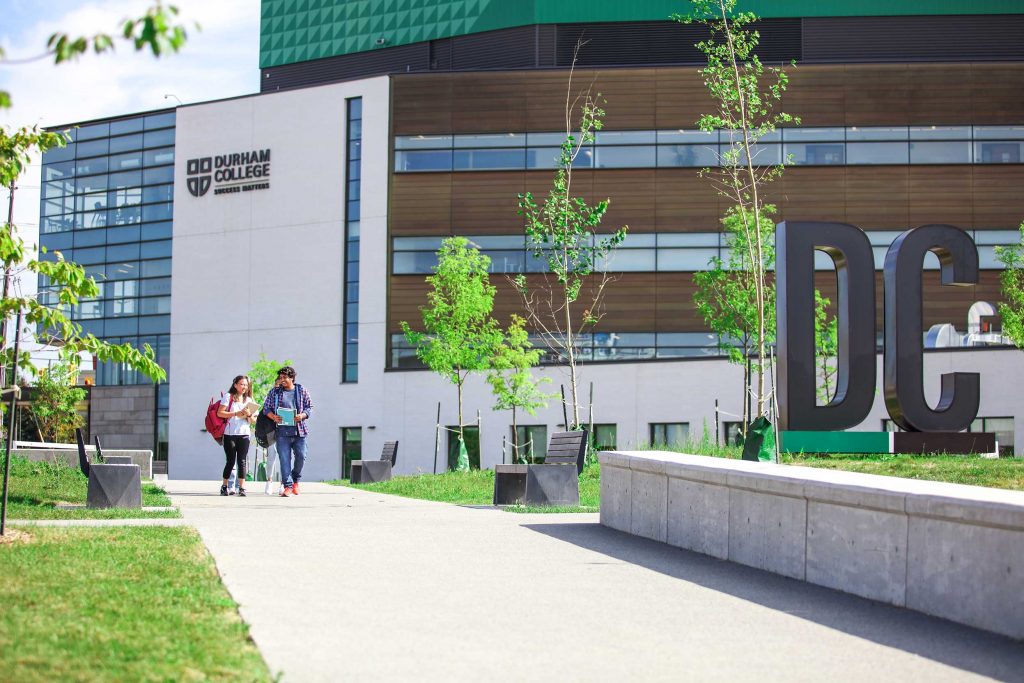Our Next Academic PD Day is happening May 1, 2025

Join us this Spring! Be sure not to miss the keynote with Lauren Waldman. Details below.

Event details
Spring Academic PD Day 🌸
Date: Thursday, May 1, 2025
Time: 8:30 a.m.
Location: Centre for Collaborative Education (CFCE)
Save your spot 🚨
Interested? Hurry! Registration closes April 25, 2025.
Registration is NOW closed
Thank you for your interest. While we are at capacity for our keynote and workshop sessions, non-registered attendees are welcome to join any of the breakout sessions available. See you on April 24!
Call for Proposals
Are you trying new tools or techniques in the classroom that others could benefit from?
As a follow-up from Fall Academic PD Day, we encourage you to submit sessions focused on your trials and tribulations using GenAI in the classroom; however, we are also open to accepting sessions that highlight general teaching, learning and assessment practices at DC. Individual and/or joint (interdisciplinary and cross-departmental) session(s) will be considered.
When completing your proposal, you will be asked to submit a title, short session description and names of co-presenters (if applicable). The session description you provide will be used in CTL promotional materials for the event, including CTL Monthly and on CTL socials.
Be A part of Academic PD Day!
Interested? Choose from a standard 45-minute session, a 20-minute mini teach session, or a poster presentation!
Alternatively, you can open this form in a new window.
Be a part of Spring Academic PD Day!
Proposals will be accepted until April 4, 2025.
Keynote Spotlight
The CTL is excited to welcome Lauren Waldman to present the keynote session during Spring Academic PD Day!
About Lauren Waldman, Learning Scientist, Founder of The Learning Pirate
 Diving into the science of the brain I became my own best case study and learning experiment. Through my challenging, emotional, and victorious learning journey, I understood what learning really is, how it feels, and how to methodically approach it—all the while gaining more familiarity with the inner workings of my brain. It was and still is a profound experience.
Diving into the science of the brain I became my own best case study and learning experiment. Through my challenging, emotional, and victorious learning journey, I understood what learning really is, how it feels, and how to methodically approach it—all the while gaining more familiarity with the inner workings of my brain. It was and still is a profound experience.
It is my passion and purpose to evolve the way we learn now. It’s equally important to bring a stronger understanding and awareness to people about the very thing doing the learning and that which makes us all us. The remarkable brain.
Qualifications
- Foundations of Neuroscience
(Harvard University, ID 5d0130dc0f8e4232bd3087f5cc392c81) - Certificate in Medical Neuroscience
(Duke University ID T98VRWVKUYAW) - Fundamental Neuroscience for Neuroimaging
(John Hopkins University, ID PC3YLPU6NW5S) - Double certified as a learning designer and adult education and training practitioner (CTDP)
Opening Keynote
Joining forces with your brain
This workshop focuses on designing learning for the brain, highlighting neuroscience principles to enhance learning design and effectiveness. Faculty will be introduced to key neuroscience principles relevant to learning and teaching, provided with practical strategies for designing brain-friendly learning experiences, and equipped with tangible takeaways and a cheat sheet for immediate application in their teaching practice.
The interactive session will cover:
- Understanding the brain: Fundamental neuroscience principles related to learning, memory, attention, and focus.
- Designing for the brain: Techniques and strategies to create effective learning environments and materials based on how the brain learns best.
- Practical applications: Real-world examples and hands-on activities to illustrate how these principles can be applied in everyday teaching.
Joining Forces with Your Brain
This workshop focuses on designing learning for the brain, highlighting neuroscience principles to enhance learning design and effectiveness. Faculty will be introduced to key neuroscience principles relevant to learning and teaching, provided with practical strategies for designing brain-friendly learning experiences, and equipped with tangible takeaways and a cheat sheet for immediate application in their teaching practice.
Learning Outcomes
- Understanding the brain: Fundamental neuroscience principles related to learning, memory, attention, and focus.
- Designing for the brain: Techniques and strategies to create effective learning environments and materials based on how the brain learns best.
- Practical applications: Real-world examples and hands-on activities to illustrate how these principles can be applied in everyday teaching.
Schedule
Last updated: April 14, 2025 at 2 p.m.
🌎 Global Classroom
1️⃣ CFCE 117
2️⃣ CFCE 118
3️⃣ CFCE 119
[ 🌎 Global Classroom ][ 1️⃣ CFCE 117 ][ 2️⃣ CFCE 118 ][ 3️⃣ CFCE 119 ]
TIME
SESSION
8:30 a.m.
Registration
8:45 a.m.
🌎 Welcome & Land Acknowledgement
with Dr. Jean Choi & Amanda Maknyik
9 a.m.
🌎 Joining Forces With Your Brain
with Lauren Waldman, The Learning Pirate
10:30 a.m.
Break
10:45 a.m.
Breakout Sessions / Block A [40 minutes]
with Tanya Wakelin [CTL]
Have questions about Coursedog? Throughout the day, feel free to drop by the global classroom to have them answered.
with Amy Jenne [CTL]
As a follow up to our Keynote, we will have the opportunity to apply our learning to deconstructing a lesson plan. We will consider wise pratices in promoting student learning and retention by using our understanding of the brain and how it learns best! Please bring a copy of a lesson plan from a course you teach for us to work through in groups.
Discover how the new Agent function in Copilot can streamline your workflow with personalized prompts and an AI assistant. Learn practical applications for enhancing communication and maybe learn some hidden MS features while you are at it!
with Kelly Alexander [Kritik]
In this session, participants will discover how peer learning with Kritik can elevate collaboration and engagement in their courses. The discussion will focus on practical strategies for implementing effective peer assessment, enabling students to learn from diverse perspectives and actively contribute to each other’s growth.
11:25 a.m.
Break
11:35 a.m.
Breakout Sessions / Block B [25 minutes]
with Tanya Wakelin [CTL]
Have questions about Coursedog? Throughout the day, feel free to drop by the global classroom to have them answered.
with Jenn Fournier [CTL]
Participants will explore the concept of authentic assessments as a process of growth that is not measured solely by finite grades but by the process of learning itself, emphasizing the entire learning journey. The discussion will harmonize insights from wholistic Indigenous pedagogical methods on how to create meaningful, learner-centered assessments that align with real-world applications.
Struggling with the demands of research and course preparation? Discover how generative AI tools like Google's NotebookLM and ChatGPT's Deep Research can revolutionize your academic workflow. In this hands-on professional development session, you'll learn to automate research tasks, synthesize information from multiple sources, and create engaging instructional content—including audio summaries, lecture materials, quizzes, and study guides. Whether you're aiming to enhance your teaching materials or streamline your research process, this session offers practical strategies to integrate AI effectively into your academic practice—no prior technical experience required.
with Mia Clark [Campus Libraries]
When promoting integrating Open Educational Resources (OERs) into courses, we often emphasize the cost saving benefits for students and downplay the cost for instructors: time. OERs can be time consuming to find, adapt, and create, but the benefits to you as an instructor can by far outweigh the challenge of integration, including diversified content, tailored resources, and increased student engagement. Attendees will learn about three practical approaches to including OERs in courses and a variety of supports to help overcome initial challenges and ensure success for both you and your students. Please bring a device to this session with internet connection capabilities, such as a laptop.
12 noon
Break
12:05 p.m.
Breakout Sessions / Block C [25 minutes]
with Tanya Wakelin [CTL]
Have questions about Coursedog? Throughout the day, feel free to drop by the global classroom to have them answered.
During this session, Craig and Kelly will provide an overview and update of SALS services. They will primarily focus on how SALS incorporates the Science of Learning principles to create and develop durable learning in students, supporting their academic success in the classroom and beyond.
with Jonathan Carrigan [BIT]
Struggling with the demands of research and course preparation? Discover how generative AI tools like Google's NotebookLM and ChatGPT's Deep Research can revolutionize your academic workflow. In this hands-on professional development session, you'll learn to automate research tasks, synthesize information from multiple sources, and create engaging instructional content—including audio summaries, lecture materials, quizzes, and study guides. Whether you're aiming to enhance your teaching materials or streamline your research process, this session offers practical strategies to integrate AI effectively into your academic practice—no prior technical experience required.
with Mia Clarkson [Campus Libraries]
When promoting integrating Open Educational Resources (OERs) into courses, we often emphasize the cost saving benefits for students and downplay the cost for instructors: time. OERs can be time consuming to find, adapt, and create, but the benefits to you as an instructor can by far outweigh the challenge of integration, including diversified content, tailored resources, and increased student engagement. Attendees will learn about three practical approaches to including OERs in courses and a variety of supports to help overcome initial challenges and ensure success for both you and your students. Please bring a device to this session with internet connection capabilities, such as a laptop.
12:30 p.m.
Strategic Plan pop-up
Help inform our new Strategic Plan and shape the future of Durham College! Stop by our pop-up for a quick chat and to share your thoughts.
🌎 Lunch, Poster Presentations & Giveaways
with Michelle Rivers and Dr. Lynne N. Kennette
Save your spot 🚨
Interested? Hurry! Registration closes April 25, 2025.
